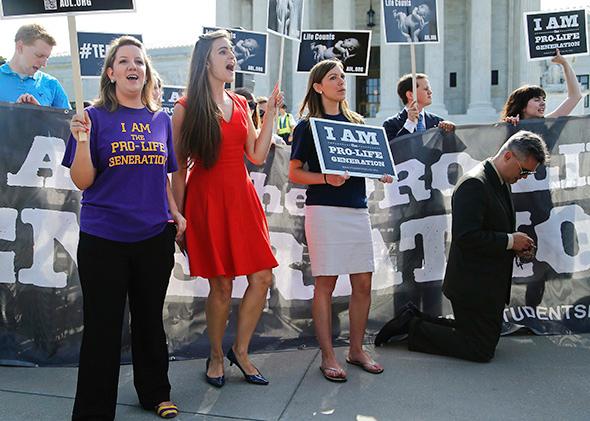The Supreme Court ruled 5–4 on Monday that Hobby Lobby, a family-owned hardware retail chain, has a right to religious freedom. A crucial issue dividing the majority and the dissents was what kinds of corporations have this right. For the majority, Justice Alito argued that since churches and non-profit religious groups are already considered “persons” according to the law at issue in the case, “closely held” for-profit companies are too. In dissent, Justice Ruth Bader Ginsburg disagreed. She argued that for-profit entities have “no consciences, no beliefs, no feelings, no thoughts, no desires,” and so can’t have religious freedom rights.
What does the American public think about religious rights for corporations? Over the past few months, we’ve conducted a series of surveys, delivered online to more than 300 people across the country between the ages of 18 and 76. More than 35 percent of participants describing themselves as somewhat religious and a further 25 percent describing themselves as extremely religious. Our respondents also varied in terms of their political views, race, and income.
To understand how people think about corporate rights, we asked how important they thought the religious liberty right of a company’s owner, its employees, and the company itself, on a scale of 1 to 7. We asked about a family owned small company, a local publicly traded chain, a national mega corporation, a secular non-profit organization, and a church.
Our respondents consistently agree that religious liberty is important for both individual employees and owners. In contrast, respondents were significantly and consistently less willing to grant the same scope of protection to all the for-profit companies we presented them. The structure of these companies made little difference. In line with Justice Ginsburg’s dissent, people did distinguish between for-profit and non-profit organizations, deeming the latter to be more deserving of religious liberty rights. But even when the religious liberty of a church is at stake, people viewed it as much less deserving of religious rights than its employees and officers.
The results didn’t vary much along ideological lines. Conservative participants showed similar patterns to liberal ones, consistently preferring to extend religious liberty rights to owners and employees rather than to companies.
Here’s a chart that illustrates our findings. The two top lines show how people rated religious liberty for individual employees and owners, in different corporate settings. The (much) lower line shows the ratings given to the company or non-profit organization.
The result here applies to more than religious freedom. We also found that people are less willing to extend privacy and speech rights to corporations compared with their owners and employees.
Justice Alito writes that the reason for treating corporations as “persons” “is to provide protection for human beings.” Our results suggest many Americans agree with this goal—but have a very different understanding of how to reach it.
